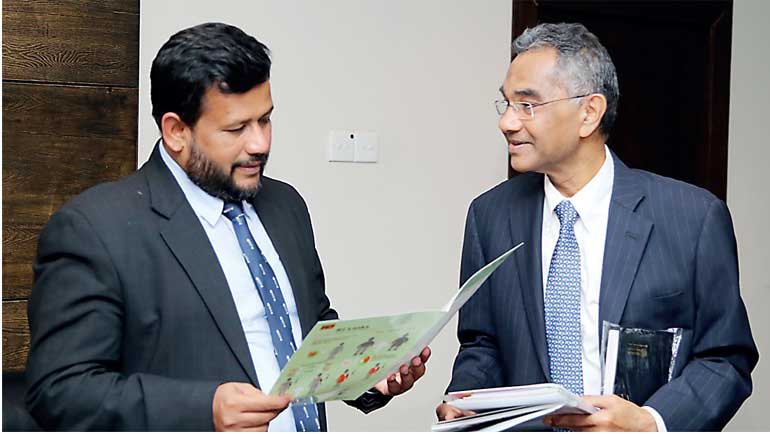Saturday Feb 21, 2026
Saturday Feb 21, 2026
Monday, 20 February 2017 00:31 - - {{hitsCtrl.values.hits}}

Minister of Industry and Commerce Rishad Bathiudeen and WHO Representative in Sri Lanka Dr. Jacob Kumaresan in Colombo on 16 February
The rallying call for Sri Lanka’s much-needed Consumer Product Test Lab received a sudden boost when the specialised agency for public health across the world threw its support behind the initiative on 16 February.
“This will assure the speed and high quality of market product testing and lab reports of Sri Lanka’s CAA,” said WHO Representative in Sri Lanka Dr. Jacob Kumaresan on 16 February in Colombo, while in discussion with Minister of Industry and Commerce Rishad Bathiudeen about WHO’s position on the proposal to establish a Product Testing and Safety Lab for Sri Lanka’s apex consumer protection body, the Consumer Affairs Authority (CAA).
Also present were Senior Advisor to Bathiudeen, Himali Jinadasa, Hettigoda Industries Ltd. Director Vidyani Hettigoda and CAA officials.
Bathiudeen, stating Sri Lanka’s case for a national consumer testing lab, explained: “The Consumer Affairs Authority is the apex Government organisation established to protect consumers’ interests and ensure fair market competition in Sri Lanka. We seek WHO assistance to CAA’s proposed Product Testing and Safety Lab. This project, once constructed, shall be a milestone in our consumer protection history. Our proposal for the lab, if supported, can enhance Sri Lanka’s consumer protection greatly from where it is present.”
Bathiudeen added: “CAA collects samples of food items and tests for quality parameters. CAA’s experience is that monitoring mechanisms such as testing are not sufficient enough to eliminate the malpractices in the supply chain. The mechanism is also not able to cover the entire country. Insufficient testing facilities to get analytical reports on food items is another hindrance that CAA has been facing for a long time. Some testing labs are not accredited. Also we need to test imported products better. Therefore I am keen to establish a dedicated, high performance lab for CAA’s demanding lab work. Our Government, consumers and the CAA shall be thankful if WHO can support this venture.”
Among the quality parameters tested in the market by CAA are added sugar content, salt content of snacks, fast food fat content, testing vegetables for pesticides, bottled water chemical and micro biological properties, etc.
WHO’s Dr. Kumaresan said that such a lab would strengthen domestic consumer protection greatly. “It appears that Sri Lanka has multiple number of labs for product testing and this is not as supportive as it seems. We suggest a single, centralised national level lab for all frequent testing of consumer products. Such a centralised lab will assure the high quality of test reports, speed, stronger legal protection and better labelling. This is a promising project but not a responsibility of one ministry but a joint effort. Funds could be sourced from international agencies such as the World Bank if CAA proposal can be jointly worked with the stakeholders of legal, health and food processing sectors. In fact, the proposed CAA Lab is a good exercise in consumer protection in Sri Lanka since all the stakeholders would be coming together for a national project that concerns the market and health at the same time. It also ensures a single centre of origin in the country for food safety in testing the samples.”
The samples collected from the market by CAA are presently not sent to a single, centralised unit for reports but to multiple agencies—the Government Analyst, City Analyst, Medical Research Institute (MRI), Industrial Technology Institute (ITI) and Sri Lanka Standards Institute (SLSI). This burdens CAA processes and results in unexpected delays, at times.
WHO is the UN’s specialised agency for public health across the world, established way back in 1948.